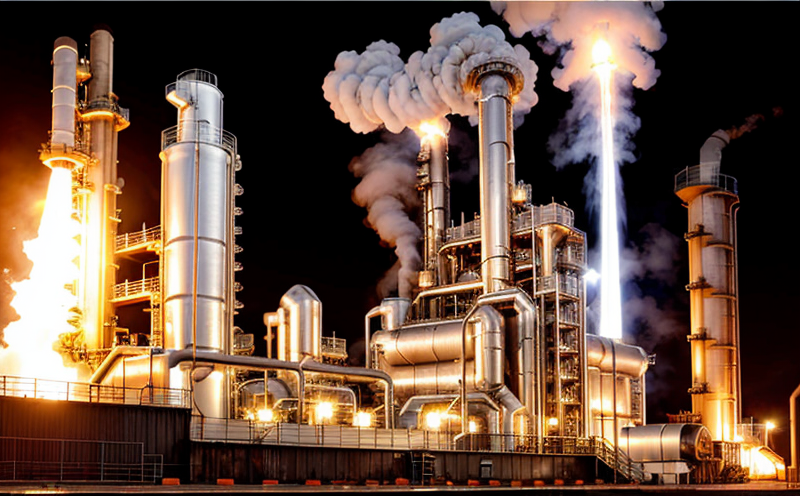ASTM E1916 Refining Control of Tin-Bearing Alloys
The ASTM E1916 standard provides a comprehensive method for refining control of tin-bearing alloys, which are widely used in the manufacturing of various products including electrical components, bearings, and solder materials. This test ensures that the specified amount of tin is accurately controlled during the alloying process to meet stringent quality standards.
The ASTM E1916 test involves a series of steps designed to refine the composition of tin-bearing alloys by removing unwanted elements while ensuring an optimal level of tin content. The process begins with thorough sample preparation, where the alloy samples are carefully weighed and then heated in a controlled environment to allow for the separation of tin from other metals.
Once the refining process is complete, the samples undergo detailed analysis using advanced instrumentation such as inductively coupled plasma-optical emission spectrometry (ICPOES) or X-ray fluorescence (XRF). These techniques provide precise measurements that help determine if the alloy meets the specified tin content requirements. If any deviations are found, corrective actions can be taken to adjust the refining process accordingly.
The ASTM E1916 test is particularly important for quality managers and compliance officers who need to ensure that their production processes adhere to industry standards. For R&D engineers, this test offers valuable insights into the optimal conditions for refining tin-bearing alloys, which can lead to innovations in alloy composition and properties. Additionally, procurement professionals benefit from this service by gaining confidence in the quality of raw materials used in their supply chain.
Quality assurance is a critical aspect of the ASTM E1916 test, as it ensures that each batch of refined tin-bearing alloys meets the exact specifications outlined in the standard. This reliability is essential for maintaining consistent product quality and meeting customer expectations. The testing process also helps identify any potential issues early on, allowing for timely adjustments to the refining process.
The ASTM E1916 test supports a wide range of industries that rely on tin-bearing alloys, including automotive manufacturing, electronics production, and aerospace engineering. By adhering to this standard, manufacturers can ensure that their products are safe, reliable, and meet regulatory requirements.
- Thorough sample preparation for accurate analysis
- Use of advanced instrumentation for precise measurements
- Detailed reporting on tin content and other alloy properties
- Identification and correction of deviations from specified standards
In summary, the ASTM E1916 refining control test is an indispensable tool for ensuring that tin-bearing alloys meet the highest quality standards. This service provides valuable insights into the refining process, helping manufacturers achieve consistent product quality and compliance with industry regulations.
Eurolab Advantages
At Eurolab, we pride ourselves on offering unparalleled expertise in metallurgical testing services. Our team of experienced professionals is dedicated to providing accurate, reliable results that meet the highest standards set by international organizations such as ASTM.
- State-of-the-art facilities equipped with cutting-edge instrumentation
- Acknowledged compliance with ISO/IEC 17025 accreditation
- Experienced and certified technicians specializing in metallurgical testing
- Dedicated customer support for prompt queries and results delivery
We understand the importance of timely and accurate test results, which is why we offer fast turnaround times without compromising on quality. Our commitment to excellence ensures that you receive reliable data that can be trusted for making informed decisions.
By choosing Eurolab, you are investing in a partner who understands your unique needs and challenges. Our flexible approach allows us to tailor our services to fit the specific requirements of your projects, whether it's routine testing or complex research and development tasks.
Why Choose This Test
The ASTM E1916 refining control test is a crucial component in maintaining high standards of quality for tin-bearing alloys. By choosing this service, you are investing in a robust process that ensures the optimal level of tin content and minimal impurities.
This test offers numerous benefits to various stakeholders within an organization:
- Quality Assurance: Ensures consistent product quality by identifying and correcting deviations early on.
- Compliance: Meets regulatory requirements and industry standards, reducing the risk of non-compliance penalties.
- R&D Innovation: Provides valuable insights into refining processes, leading to advancements in alloy composition and properties.
- Supplier Evaluation: Assures that raw materials meet specified tin content levels, enhancing supply chain reliability.
The ASTM E1916 test is particularly beneficial for industries such as automotive manufacturing, electronics production, and aerospace engineering. These sectors rely heavily on high-quality tin-bearing alloys to ensure the safety and performance of their products.
By choosing this service, you are not only ensuring compliance with industry standards but also contributing to the overall reliability and safety of your products. This test helps maintain a competitive edge in the market by delivering consistent quality that meets customer expectations.
Quality and Reliability Assurance
The ASTM E1916 refining control test is designed to provide high levels of quality assurance and reliability for tin-bearing alloys. This section outlines some key aspects of our service that ensure accuracy and precision in testing:
- Precision Measurement: Utilization of advanced instrumentation such as ICPOES and XRF ensures precise measurements.
- Detailed Reporting: Comprehensive reports are provided detailing tin content and other alloy properties, ensuring transparency and traceability.
- Early Identification of Issues: The test allows for early detection of any deviations from specified standards, enabling timely corrective actions.
- Consistent Results: Our stringent quality control measures ensure consistent results across multiple batches, enhancing product reliability.
We employ a rigorous process that involves thorough sample preparation, controlled heating, and detailed analysis using industry-standard techniques. This approach ensures that the test results are accurate and reliable, providing you with confidence in your final products.
At Eurolab, we take pride in our commitment to excellence. Our team of experienced professionals is dedicated to delivering high-quality services that meet the highest standards set by international organizations such as ASTM. By choosing this service, you are investing in a partner who understands your unique needs and challenges.





